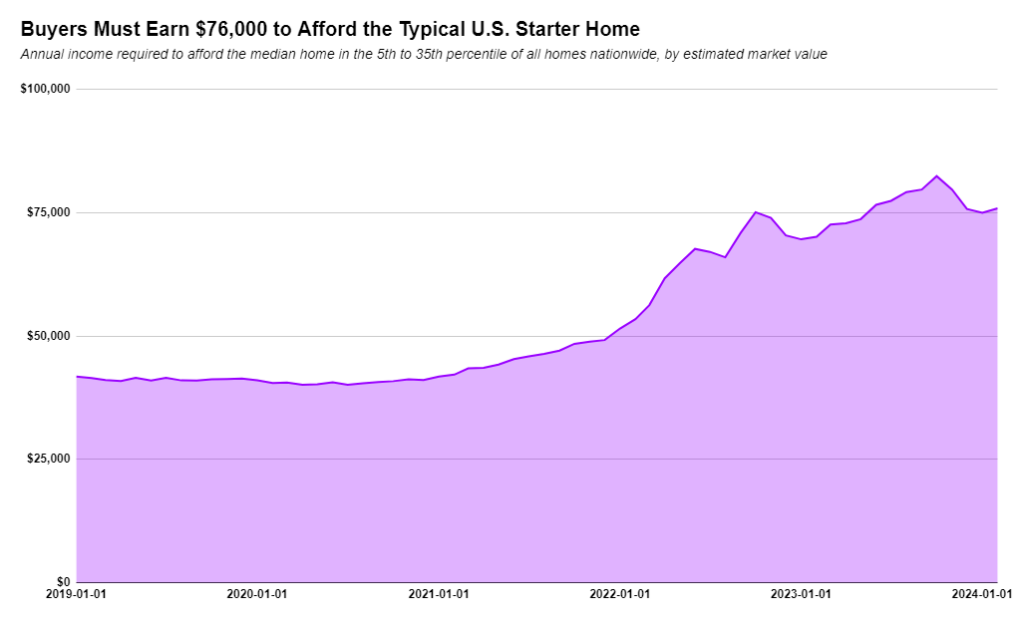As of February, the average U.S. starter home required an annual income of $75,849, which was 8.2% ($5,767) more than a year earlier, according to a new Redfin report. In February, the typical U.S. starting home’s monthly housing payment increased by 8.2% to $1,896 from the previous year.
The income required to purchase starter homes has increased compared to a year ago because of rising mortgage rates and prices: The average 30-year fixed mortgage rate was 6.78% in February, up from 6.26% the previous year, and the average starting home sold for $240,000, up 3.4% year-over-year.
Per the report, the cost of starter homes has decreased by around half since the pandemic. When the median sale price was $169,000 and the average mortgage rate was roughly 3.5% in February 2020, Americans had to make $40,465 per year to afford the average U.S. starter home.
“The pandemic housing-market boom changed the definition of a starter home,” said Elijah de la Campa, Senior Economist at Redfin. “A decade ago, many people thought of a starter home as a small three-bedroom single-family house. Now that type of home could cost seven figures, especially in expensive parts of the country.”
Metro-Level Highlights for Starter Homes: February 2024
- The income needed to afford a starter home is highest in California. A homebuyer needs to earn roughly $319,000 to buy the median-priced starter home in San Jose, $306,000 in San Francisco, and $247,000 in Anaheim.
- It’s lowest in the Rust Belt: Detroit ($22,000), Pittsburgh ($32,000) and St. Louis ($37,000).
- The income needed to afford a starter home declined in just 1 metro area: Pittsburgh (-0.8% year over year to $32,000).
- It increased most in New Brunswick, NJ (17.5% to $126,000), Miami (16.7% to $104,000) and Montgomery County, PA (16% to $99,000).
Americans Earning the Median U.S. Income Can Still Afford the Typical Starter Home
Although income growth is slower than the cost of a starter home, it is nonetheless occurring. As of February 2023, the average American household’s income is predicted to be $84,072, which represents a 5.5% increase from the 8.2% increase required to purchase a starter home. As a result, although the average household can still afford the $75,849 median-priced starter home, their disposable income after housing payments has decreased.
The income required to purchase a starter home is merely 11% greater than the median household income of today. The typical household income was 14% greater a year ago than what was needed to purchase a starter home, and it was 63% higher four years prior—right before the epidemic started.
Looking beyond starter homes to the entire market, a different Redfin analysis discovered that a buyer needs to make $114,000, or almost $30,000 more than the average American household income, to afford the average American home.

For Lower-Income Families, It’s Increasingly Hard to Buy a Starter Home
In the past, it was frequently true that, in much of the nation, those with incomes below the median could purchase starter homes, which were seen to be a cost-effective option for first-time homebuyers.
In the present day, an individual earning $67,258—80% of the median income—could not buy the average American starter home. Prior to the pandemic real estate boom, the average starter home, which required an annual income of little over $40,000, was affordable for someone making 80% of the median wage, or about $53,000 in early 2020.
“The most affordable homes are much smaller and often require a lot of work to make them habitable—which makes them cost even more,” said de la Campa. “Today’s most affordable homes are still hard for the average American to afford, let alone the average first-time buyer who tends to put less money down in exchange for higher monthly payments. Rising prices and mortgage rates are pushing buyers who earn more than the median income to buy starter homes, and often pushing buyers who earn less money out of the market.”
First-time homebuyers also have the difficulty of frequently facing competition from all-cash offers for the few available starter properties. In February, over one-third (36.5%) of the starter houses in the country were bought with cash, which is close to the highest percentage in a decade. Many of those houses probably went to real estate investors, who are renting them out and taking them off the market as starter homes for sale. Others most likely used the equity from a prior sale to sell to repeat buyers.
Starter Homes are Now More Affordable Than They Were Last Fall
Although it is higher now than it was a year ago, the income needed to purchase a starter house is lower than it was at its peak in October of last year—an estimated $6,524. This is a result of the recent decline in mortgage rates from their peak. Mortgage rates have dropped from a two-decade peak of 7.8% in October 2023 to a current level of 6.8%. As mortgage rates continue to progressively drop through 2024, affordability should continue to improve.
Other Encouraging Signs for First-Time Buyers:
- In some metros, first-time buyers are able to negotiate prices down or get concessions from sellers because high costs are pushing down homebuying demand.
- There are more starter homes to choose from. Active listings of starter homes rose 7% annually in February, the biggest increase in at least a decade.
The caveat is that the number of starter homes on the market fell to a record low in February 2023, which is part of the reason for the big year-over-year uptick, according to Redfin.
To read the full report. including more data, charts, and methodology, click here.






